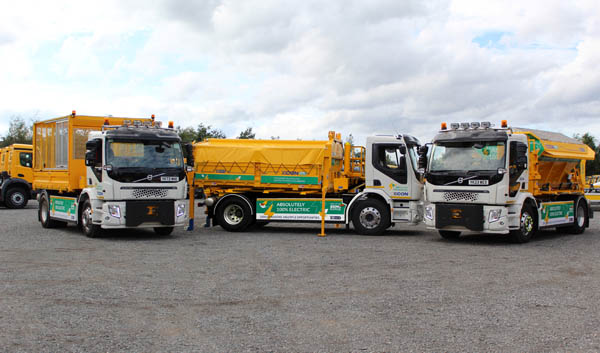Highways pays tribute to a Yorkshire-born design and engineering classic that has stood the test of time and continues to give great value to UK councils - the Econ Quick Change Body (QCB).
Econ's famous QCB may have been born in the 1980s, but as it celebrates its 35th birthday this year, it remains a vital part of the modern-day road maintenance fleet.
Developed and adapted over time, the premise remains the same as it did back in 1989 when Leeds City Council tentatively asked if it was possible to build a vehicle that could be utilised all year round.
Keen to find a more flexible option, council officials asked North Yorkshire-based Econ Engineering for a versatile, robust vehicle that not only met the demands of its various highways tasks but also delivered significant cost-saving solutions across its fleet.
The resulting QCB provided a trailblazing all-season maintenance solution and one that remains just as important today as councils up and down the country battle for cost efficiencies amid reports of a £4bn funding gap for 2024-25.

Financial emergencies have been issued in a string of councils across the UK, making the need for more cost-effective solutions all the more pertinent.
The QCB stands together with its new cousin, the ground-breaking 100% electric E-QCB, as a potential saviour by offering a comprehensive choice of bodies which can be mounted on a single chassis through an innovative swap body system – allowing customers to benefit from maximum yield in one single capital investment.
Options include gritters, tippers, hotboxes, tankers, platforms and box bodies, while more specialist application bodies can also be bespoke manufactured at Econ’s Ripon factory to meet more precise needs.
The versatile QCB body can be swapped in under fifteen minutes with just one operative at the helm, while the SPARGO control system provides drivers with a universal control box for both winter and road maintenance vehicles.
One of the new E-QCBs will take centre stage on the Econ stand at next week’s Cold Comfort event co-located with Traffex at Coventry’s CBS Arena, while a video charting the history of the original model will be played throughout their two-day stay.
Another of the electric vehicles will travel up to Scotland where the Econ team will also be attending the APSE Scotland Fleet, Waste and Grounds seminar at the MacDonald Aviemore Highland Resort.
Econ Engineering managing director, Jonathan Lupton, was involved in the initial dealings with Leeds City Council back in the late 1980s and as the business prepares to mark its 55th birthday this summer, he is quick to pay tribute to what has been a lasting design legacy.
'The fact that we are here today still talking about the QCB and the crucial role it plays on our nation’s highways is testament to the designers and our team of employees right across the Econ factory,' said Mr Lupton.
'We were rightly proud of the swap body system when it was first introduced back in 1989, and for it to still be in use today and be seen as an integral piece of road maintenance kit across the UK, shows just how ahead of our time we were back then.
'The new E-QCB may now take all the headlines as it is the next phase in the evolution of the product, and we are really excited about what that product will go on to achieve, but none of its success would have been possible without the original QCB model.'
Econ unveiled the market’s first fully electric road maintenance vehicle last year, with the E-QCB boasting zero tailpipe emissions, ULEZ exemption, almost-silent running and an enhanced driver experience due to reduced vibrations and noise.
A series of nation-wide demonstrations resulted in highways maintenance specialists Ringway purchasing the first electric vehicle, while other loan deals have also been agreed in London.
Whether it is the original version, or the electric model, all QCBs have dry, pre-wet and liquid de-icing capacities from 3m cubed to 9m cubed, with an array of demountable body options available.
You can register for Traffex and Cold Comfort for FREE here.





